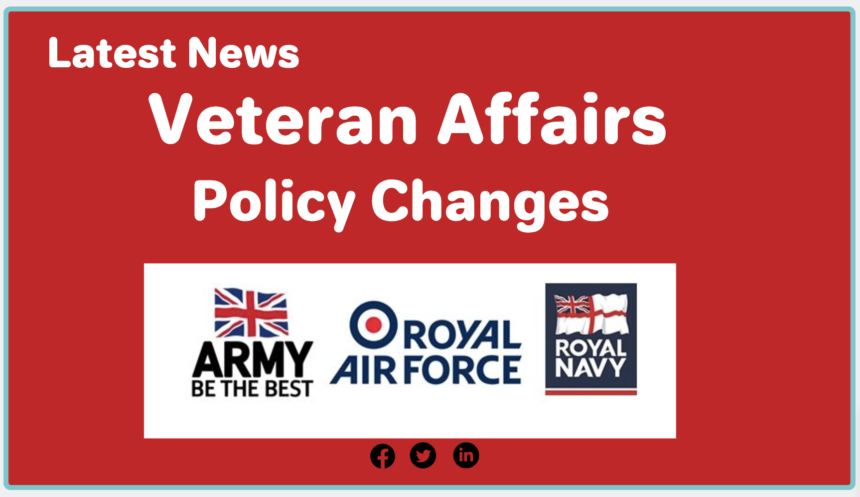The historical context of U.K. veteran policies is rooted in the nation’s long-standing commitment to supporting those who have served in the armed forces. Following both World Wars and subsequent military engagements, the United Kingdom has developed a framework to ensure veterans receive necessary care and recognition. The cornerstone of these policies is the Armed Forces Covenant, which emphasizes the moral obligation to support veterans and their families, acknowledging the sacrifices made during service.
Despite these established frameworks, veterans continue to face significant challenges, including mental health issues, homelessness, and difficulties in transitioning to civilian life. Reports indicate that a considerable number of veterans struggle with post-traumatic stress disorder (PTSD) and other mental health challenges, making it vital for the government to address these concerns through effective policies and support systems. Moreover, access to healthcare and social services remains a persistent obstacle for many veterans, further highlighting the urgency for reform in veteran policies.
Recent initiatives have begun to tackle these ongoing issues, emphasizing not only the importance of service but also the need for comprehensive support. Reforms aim to provide holistic care, integrating mental health services with employment support and housing solutions. Key concepts in veteran policy include rehabilitation, integration, and recognition, which serve to strengthen the commitment to those who have served. The emergence of organizations focusing on veteran advocacy underscores the growing recognition of the need for reform that meets contemporary needs and addresses systemic barriers.
As the landscape of veteran support evolves, ongoing conversations about best practices and proven approaches will play a crucial role in shaping future policies. The need for reform stems not only from a legal obligation but from a societal commitment to ensure that those who have defended the U.K. are provided with the respect and resources they deserve.
Overview of Recent Reforms
In recent years, the United Kingdom has undertaken significant reforms in veteran policies aimed at enhancing the welfare and support of former service members. These reforms have been motivated by the recognition of the unique challenges faced by veterans upon their return to civilian life. The legislative changes have spanned multiple areas, including policy updates, enhancements in benefits, and the implementation of additional support programs.
One of the key objectives of these reforms is to ensure that veterans receive the necessary assistance to reintegrate into society successfully. This includes addressing mental health issues, which are increasingly recognized as critical to the overall well-being of veterans. Various bodies, including the Ministry of Defence, the Office for Veterans’ Affairs, and various military charities, have played essential roles in the legislative process, collaborating to ensure that the reforms are comprehensive and effective.
Among the notable reforms is the introduction of the Veterans’ Strategy Action Plan, which focuses on improving educational opportunities, employment prospects, and health care access for veterans. Furthermore, adjustments to benefits have also been a significant focus, with enhancements to the Armed Forces Compensation Scheme intended to provide better financial support for injured veterans. Such changes reflect a growing commitment to ensure that former service personnel receive the dedicated assistance they need.
Additionally, the reforms have established various support programs aimed at tackling homelessness and fostering community integration among veterans. By distinguishing between different types of reforms, it is evident that the U.K. government is actively working to create a more robust framework for veteran support. These advancements underscore the importance of acknowledging and addressing the diverse needs of those who have served in the armed forces, thus reinforcing society’s commitment to its veterans.
Impact on Financial Benefits for Veterans
Recent reforms in U.K. veteran policies have significantly altered the landscape of financial benefits available to those who have served in the armed forces. Among the most notable changes are updates to pensions and disability allowances, aimed at enhancing the economic wellbeing of veterans and their families. These reforms reflect a broader recognition of the sacrifices made by military personnel and the unique challenges they face upon their return to civilian life.
The revised pension schemes are more favorable and cater to a wider range of circumstances. Veterans now benefit from an increase in their pension payouts, which are closely aligned with inflation, ensuring their long-term financial security. Additionally, adjustments have been made to the qualifying criteria, enabling more veterans to access these financial benefits than in the past. This expansion of eligibility is crucial for providing a safety net for former service members who may require financial assistance as they transition to civilian roles.
In tandem with pension reforms, disability allowances have also undergone significant changes. The latest modifications to the assessment process have made it easier for veterans with service-related disabilities to secure the support they need. The assessments have been simplified, focusing on the functional impacts of disabilities rather than solely on diagnosis, which allows for a more equitable evaluation of individual circumstances. This method aims to ensure that all veterans, regardless of their specific conditions, receive adequate financial support to improve their quality of life.
The cumulative effect of these reforms on the economic wellbeing of veterans and their families is substantial, providing them with the necessary resources to lead fulfilling lives after their service. As the government continues to adapt these financial support mechanisms, the focus remains squarely on enhancing stability and security for U.K. veterans.
Health Care Improvements for Veterans
The landscape of health care for veterans in the United Kingdom has seen significant enhancements in recent years, driven by a strong commitment to address the unique health challenges faced by this demographic. The reforms largely focus on increasing accessibility to essential services such as mental health and physical rehabilitation, which are critical given the unique experiences of veterans that can lead to complex health issues.
One of the primary advancements has been in the mental health services sector. Recognizing the prevalence of conditions such as PTSD and other anxiety disorders among veterans, the U.K. government has prioritized the expansion of mental health support services. This includes the introduction of dedicated helplines, increased availability of trained mental health professionals, and the establishment of specialized units within the National Health Service (NHS) that cater specifically to veterans. These units aim to create a supportive environment that acknowledges and addresses the psychological impact of military service.
In addition to mental health improvements, physical rehabilitation programmes have also been significantly bolstered. Recent reforms have led to increased funding that allows for the development of tailored rehabilitation initiatives, which are essential in assisting veterans with physical disabilities or injuries sustained during service. This funding has been allocated towards state-of-the-art facilities, enabling veterans to access comprehensive rehabilitation services, including physiotherapy, occupational therapy, and other crucial physical support systems.
Furthermore, new health care protocols have been established to streamline access to services, ensuring that veterans do not face barriers when seeking the care they desperately need. This includes simplifying appointment processes and integrating care pathways across various health care services. Ultimately, these reforms represent an ongoing commitment to improve not only the physical and mental well-being of veterans but also the overall standard of care they receive as a recognition of their service to the nation.
Support for Families of Veterans
The recent reforms in U.K. veteran policies have significantly enhanced the support mechanisms available for families of veterans. Recognizing the unique challenges faced by these families, the government has introduced various initiatives aimed at providing comprehensive assistance. One of the critical areas of focus has been on the availability of counselling services. Recognizing that families may experience emotional and psychological strains due to their loved ones’ military service, these services aim to offer necessary support. Accessible mental health resources ensure that families can cope with the realities of service-related issues, providing a safe space to express their feelings and receive professional guidance.
Moreover, financial assistance programs have been expanded to help families deal with economic uncertainties that often accompany a veteran’s transition to civilian life. The reforms include grants and subsidies targeted at alleviating financial burdens, enabling families to focus on recovery and reintegration. This financial support is vital for ensuring that families have the resources they need for housing, education, and healthcare, thereby reducing stress and promoting stability.
Community programmes have also been developed through the reforms to foster a supportive network for veterans’ families. These initiatives aim to connect families with one another, allowing them to share experiences and resources. By engaging in community activities, families can establish meaningful relationships and build resilience collectively. Such programmes often include workshops, social events, and peer support groups, which are crucial for fostering a sense of belonging and understanding among families facing similar challenges.
In addressing the needs of veteran families, recent policy reforms signify a positive step forward. By integrating various support mechanisms, the U.K. aims to create a more robust framework that assists families as they navigate the complexities presented by military service. These changes not only acknowledge the sacrifices made by veterans but also emphasize the importance of the family unit in the broader context of veteran reintegration.
Integration into Civilian Life
The transition from military to civilian life is a crucial phase for veterans, one that has garnered increased attention through various programmes and policies in the United Kingdom. Recognizing the unique challenges veterans face, these initiatives aim to facilitate smoother reintegration into society by providing adequate support in several key areas, such as employment, education, and community engagement.
Employment support is a cornerstone of the U.K.’s approach to aiding veterans. Several government-backed programmes focus on enhancing employability through tailored job training and placement services. These initiatives often collaborate with private sector employers willing to recruit veterans, taking advantage of their unique skills and experiences. Furthermore, many of these programmes offer resources for resume writing, interview preparation, and networking opportunities, thereby empowering veterans to navigate the job market effectively.
In addition to employment services, educational opportunities play a significant role in the successful transition of veterans. The U.K. government has introduced various training schemes and grants aimed at veterans pursuing further education. These initiatives encourage lifelong learning and skill development, which are essential in adapting to civilian occupational demands. Veterans can benefit from access to vocational training, apprenticeships, and even university education, reducing the barriers that may inhibit their advancement in civilian careers.
Community reintegration initiatives are equally vital in promoting the integration of veterans into civilian life. These programmes typically include social activities, support groups, and mentoring schemes designed to foster connections and build a supportive network. By encouraging veterans to participate actively in their communities, these initiatives mitigate feelings of isolation and promote mental well-being. Overall, the effectiveness of these combined efforts in aiding veterans’ transition into civilian life highlights the continuous commitment of the U.K. to support those who have served the nation.
Feedback from Veterans and Advocacy Groups
In the wake of recent reforms in U.K. veteran policies, both veterans and advocacy groups have provided critical feedback, highlighting a variety of sentiments about the changes. These insights reveal a spectrum of opinions that underscore the complexities surrounding the implementation of new policies. Many veterans express a cautious optimism, noting that improvements in mental health services and support for transitioning into civilian life have been significant. They appreciate the focus on timely access to healthcare and rehabilitation, which are essential for overall well-being.
However, there are also notable concerns among veterans regarding the effectiveness of communication and the accessibility of programs introduced by the reforms. Some veterans feel that although the policies are designed to assist those in need, they lack comprehensive outreach. They argue that many deserving individuals remain unaware of available resources or find the application processes prohibitively complicated. Advocacy groups echo this concern, advocating for better promotion of these services to ensure that all veterans can benefit from the reforms.
Furthermore, veterans’ organizations emphasize the necessity for ongoing dialogue between policymakers and the veteran community. They suggest that regular consultations can help identify areas needing further adjustment and ensure that the reforms remain responsive to veterans’ needs. Suggestions include more robust training for service providers, which would better equip them to assist veterans navigating new systems and services. Advocacy groups have also called for monitoring and assessing the long-term impacts of these reforms, urging the government to gather data on the effectiveness of the new policies.
These insights from veterans and advocacy organizations provide a valuable perspective on the recent changes. They serve to highlight the importance of continuous engagement and the need for policies to evolve based on feedback from those directly affected. This feedback not only highlights areas requiring attention but also reflects the broader sentiments of the veteran community regarding their treatment and support systems.
Challenges and Critiques of the Reforms
Despite the recent reforms in U.K. veteran policies, significant challenges remain that hinder the effective support of veterans. Although these reforms aim to address critical issues affecting veteran welfare, various shortcomings and potential areas for further improvement have come to light. One of the primary challenges is the bureaucratic obstacles that veterans continue to encounter when navigating the system. Complex procedures and lengthy forms can delay access to much-needed services, creating frustration for veterans who have already faced numerous hardships.
Additionally, there exist notable gaps in the implementation of the reforms. In certain regions, veterans may find that the promised support does not reach them effectively, leading to disparities in resource allocation and access to care. For instance, while some veterans benefit from new mental health initiatives, others may not receive the same level of service due to inconsistent delivery across various locales. This inconsistency raises questions about the overall efficacy of the reforms and whether they genuinely cater to the diverse needs of all veterans.
Furthermore, there is a pressing need for sustained advocacy to ensure that the reforms yield long-term benefits for veterans. Advocacy groups have played a vital role in voicing concerns and highlighting the deficiencies in existing policies. However, their continued involvement is crucial for addressing emerging issues and for pushing for further enhancements in the veteran support system. Without this persistent advocacy, momentum towards improvement could stall, leaving veterans vulnerable to the challenges that continue to pervade their lives.
Overall, while the recent reforms represent a step in the right direction, the residual challenges underscore the necessity for ongoing evaluation and advocacy. Addressing bureaucratic issues, improving implementation, and maintaining a focused effort on supporting veterans will be crucial to ensure that the reforms fully realize their intended impact.
Future Directions for U.K. Veteran Policies
As we look toward the future of veteran policies in the U.K., it is essential to acknowledge the significant role these reforms play in addressing the ever-evolving needs of ex-service personnel. Current trends indicate that there may be further areas requiring attention, particularly in mental health support, housing, and employment opportunities. The unique challenges faced by veterans, such as adjusting to civilian life and addressing service-related injuries, are critical aspects warranting ongoing reform and enhancement.
Advocacy groups will likely continue to play a pivotal role in shaping future policies. Their efforts in promoting awareness of veterans’ issues and lobbying for necessary changes are integral for ensuring that the voices of veterans are heard. Cooperation between the government and veteran organizations will be essential in developing effective policies that reflect the needs of these individuals. Increased funding and resources directed toward these advocacy groups may lead to more comprehensive support systems for veterans.
Moreover, continuous evaluation of veterans’ needs is vital in adapting policies to reflect changing societal norms and expectations. Regular assessments can provide insights into areas where veteran services may fall short or require further enhancement. This adaptive approach can ensure that veterans receive up-to-date support that acknowledges their unique circumstances. Engagement with veterans during these evaluations can also bolster trust in governmental actions and foster a supportive community for those who have served.
In conclusion, the future landscape of U.K. veteran policies appears to be one of dynamic change, driven by the necessity for ongoing reform, active involvement of advocacy groups, and a steadfast commitment to understanding the needs of veterans. Encouraging public engagement in supporting these issues will be crucial for fostering a society that honors and adequately supports those who have served. Active participation from citizens can contribute to a robust support network, ultimately enriching the lives of veterans across the U.K.






